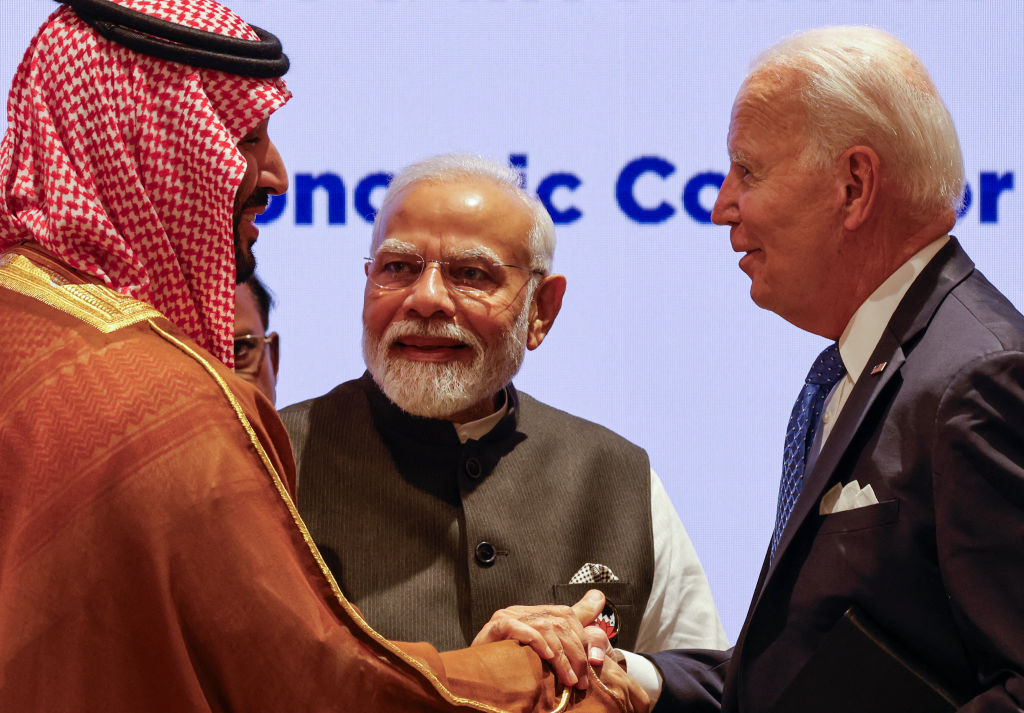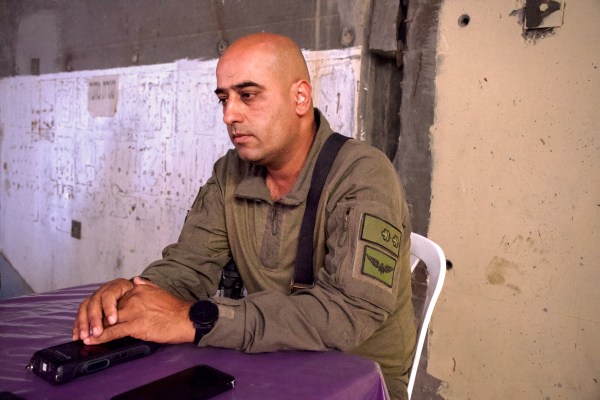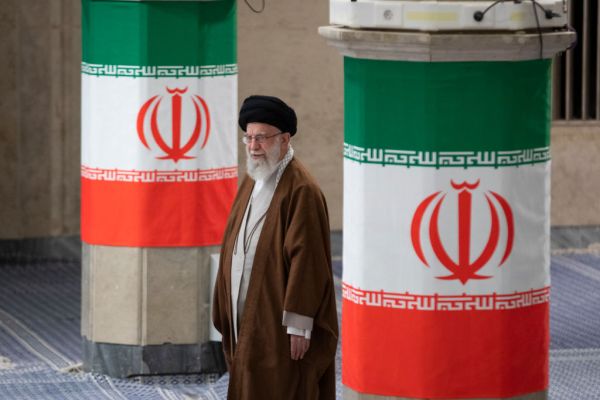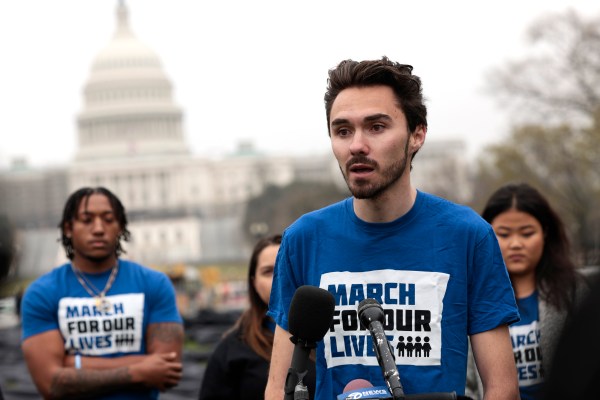Happy Thursday! It’s debate day. And if you’re thinking you may need a little liquid courage to make it through all 90 minutes, The Dispatch has you covered: Members can check out Dispatch fact-checker Alex Demas and Reason’s Peter Suderman’s debate-themed cocktail concoctions on The Skiff (🔒). If you try one, let us know!

Quick Hits: Today’s Top Stories
- The Supreme Court ruled 6-3 on Wednesday that the state attorneys general and social media users who challenged the Biden administration over its efforts during the COVID-19 pandemic to encourage social media companies to remove content it had flagged as misinformation about the COVID-19 vaccine did not have the legal right to sue, also known as standing. “The plaintiffs, without any concrete link between their injuries and the defendants’ conduct, ask us to conduct a review of the yearslong communications between dozens of federal officials, across different agencies, with different social media platforms, about different topics,” Justice Amy Coney Barrett wrote for the majority in Murthy v. Missouri. “This court’s standing doctrine prevents us from exercising such general legal oversight of the other branches of government.” Justice Samuel Alito, writing in a dissent joined by Justices Clarence Thomas and Neil Gorsuch, said the Biden administration’s efforts to pressure the companies was a First Amendment issue. “High-ranking government officials placed unrelenting pressure on Facebook to suppress Americans’ free speech,” he wrote. “Because the court unjustifiably refuses to address this serious threat to the First Amendment, I respectfully dissent.”
- The Supreme Court is likely to rule that Idaho cannot prevent doctors from performing abortions in instances in which it is necessary to “prevent serious harms to a woman’s health,” after a copy of what seemed to be the court’s ruling was briefly posted to its website on Wednesday before being quickly removed. In the case, the Biden administration argued that the Emergency Medical Treatment and Active Labor Act requires federally funded hospitals to provide “stabilizing care” to pregnant women, which could supersede Idaho’s ban on abortion in all cases except when the life of the mother is at risk. Lawyers defending Idaho’s law have argued that its various exceptions already cover scenarios outlined by the Biden administration.
- Bolivian soldiers stormed their nation’s presidential palace and crashed an armored car into the gates on Wednesday in an apparent military coup attempt that also saw soldiers briefly occupy a central square in the South American country’s capital, La Paz. The attack seemed to be orchestrated by a senior military leader, Gen. Juan José Zúñiga, who was dismissed from his role earlier this week after he threatened to arrest former Bolivian President Evo Morales in the event he ran for office again. Zúñiga was reportedly seen entering the presidential mansion, though he was shown on camera leaving the building shortly after. “We denounce irregular mobilizations of some units of the Bolivian Army,” Bolivian President Luis Arce tweeted following the attack. “Democracy must be respected.” Morales called on Bolivians to take to the streets to defend democracy.
- A United States federal judge sentenced former Honduran President Juan Orlando Hernández to 45 years in federal prison and fined the former Central American leader $8 million for helping smuggle at least 400 tons of cocaine into the U.S. during his eight-year run as president. “[Hernández] chose to abuse his office and country for his own personal gain,” U.S. Attorney Damian Williams said in March when the Justice Department indicted Hernández. “[He] partnered with some of the largest and most violent drug trafficking organizations in the world to transport tons of cocaine to the United States.” Hernández—whom U.S. officials had at one point publicly treated as an ally in the fight to stem migration—has denied all wrongdoing and is expected to appeal the decision.
- NATO member states on Wednesday formally tapped outgoing Dutch Prime Minister Mark Rutte to serve as the defensive alliance’s secretary general, with all 32 countries unanimously agreeing to his appointment. On October 1, Rutte will take the baton from former Norwegian Prime Minister Jens Stoltenberg, who has led NATO since 2014. “The Alliance is and will remain the cornerstone of our collective security,” Rutte tweeted Wednesday. “Leading this organization is a responsibility I do not take lightly. I’m grateful to all the Allies for placing their trust in me.”
- Kenyan President William Ruto on Wednesday reversed course and announced his opposition to a controversial tax hike proposal that sparked violent protests in the country’s capital, Nairobi, on Tuesday. Demonstrators clashed with police in riots that reportedly left at least 23 protesters dead—some apparently at the hands of the police— and dozens more injured, with protesters setting the parliament building and city hall ablaze. “Having reflected on the continuing conversation regarding the content of the finance bill 2024, and listening keenly to the people of Kenya … I concede,” Ruto said Wednesday. “And therefore, I will not sign the 2024 finance bill.” Ruto’s ruling party introduced the finance bill–which included income, excise, and value-added tax increases—in Kenya’s parliament last month.
- Wall Street Journal reporter Evan Gershkovich appeared in a Russian court on Wednesday for the start of his secret trial for trumped-up espionage charges, more than a year after Russian authorities detained the 32-year-old U.S. citizen in March 2023 while he was on a reporting assignment in Yekaterinburg. The Journal condemned the “sham trial” based on “fake charges,” and U.S. Secretary of State Antony Blinken has previously said Russia has provided “no evidence of wrongdoing,” officially designating Gershkovich as wrongfully detained. Russia has floated the possibility of a prisoner exchange involving Gershkovich, but only after a verdict in the trial, which could still take months.
- President Joe Biden on Wednesday pardoned approximately two thousand former servicemembers who were convicted of having gay sexual relations under the Uniform Code of Military Justice, which criminalized gay sex in the military for more than sixty years—from 1951 to 2013. “Today, I am righting an historic wrong by using my clemency authority to pardon many former service members who were convicted simply for being themselves,” the president said in a statement. “Despite their courage and great sacrifice, thousands of LGBTQI+ service members were forced out of the military. … Some of these patriotic Americans were subject to court-martial, and have carried the burden of this great injustice for decades.” Those who want their convictions overturned can now apply for a certificate of clemency, which could allow them to receive benefits they were denied and upgrade their discharge from the military if they were relieved of duty under a dishonorable discharge.
- The man accused of killing seven people and injuring dozens more in a shooting at a Fourth of July parade near Chicago in Highland Park, Illinois, in 2022 backed out of his plea deal last-minute at court on Wednesday. He pleaded not guilty to charges in August 2022 but was expected to accept a plea deal this week. The accused shooter, 21 years old at the time of the massacre, remained silent on Wednesday when the judge asked for his verbal acknowledgment, and shortly after, his public defender announced he would not accept a plea deal. A trial date was set by the judge for February 2025.
Biden’s Grand Bargain

In November 2019, when debate moderators asked then-Democratic presidential primary candidate Joe Biden about punishing Saudi Arabia’s leaders for the killing of Washington Post journalist Jamal Khashoggi and the country’s poor human rights record, Biden didn’t mince words.
“We were going to, in fact, make them pay the price and make them, in fact, the pariah that they are,” he said. “There’s very little, social redeeming value in the present government in Saudi Arabia.”
As president, Biden initially seemed ready to make good on his promise. Shortly after taking office in January 2021, he paused arms sales to the kingdom. The following month, he released a declassified report from the Office of the Director of National Intelligence that indicated Saudi Crown Prince Mohammad Bin Salman (MBS), the heir to the throne and de facto ruler, personally ordered Khashoggi’s execution. Biden sidelined MBS in a move to “recalibrate” the relationship, opting to communicate instead with the prince’s ailing father, King Salman bin Abdulaziz Al Saud. The administration also sanctioned several Saudi security officials allegedly involved in the murder and restricted the visas of 76 Saudi nationals connected to efforts to threaten dissidents outside of the country.
But before long, Biden began a slow-rolling 180 in his approach to the Gulf state. The president visited Saudi Arabia in July 2022, exchanging a controversial fist bump with MBS, which was followed by a hearty handshake—literally brokered by Indian Prime Minister Narendra Modi—at the G20 Summit in India last September. Now, Biden is preparing to offer the kingdom a bear hug.
For at least the last 18 months, Saudi and U.S. officials have been negotiating a landmark security pact, the specifics of which are “near final,” according to the White House. But the deal—which in other years would be the biggest story in the region—has been overshadowed by the Israel-Hamas war in Gaza and faces an uncertain future at best.
The potentially historic deal—many months in the making—seems set to include a mutual defense agreement, protections for arms deals, and U.S. support for Riyadh’s civilian nuclear program. The mutual defense pact, in particular, would put Saudi Arabia in an exclusive strata of U.S. allies that America is obligated to defend if they’re attacked.
So how did the Saudis go from “pariah” to pals in just a matter of years? After Russia invaded Ukraine, Biden administration officials started rethinking their approach to U.S.-Saudi relations, particularly as oil and gas prices rose. That “reset” culminated in a July 2022 trip to the kingdom, which the president reportedly resisted for months. But Biden wrote an op-ed ahead of the visit, justifying both the trip and collaboration with the Saudis as a means to improve security and stability in the region.
The relationship hasn’t been perfectly smooth since that trip, but it was once again on the upswing when it became clear that Saudi leaders were interested in a deal to normalize relations with Israel in exchange for a defense agreement with Washington.
Significantly, the Saudis appeared open to an agreement without major Israeli concessions on Palestinian statehood, which had previously been a non-negotiable prerequisite for Saudi recognition of Israel. In the summer of 2023, the U.S. dispatched high-ranking officials to the Gulf nation—including National Security Advisor Jake Sullivan and Secretary of State Antony Blinken—in an effort to build out the framework for a deal. Reports on the negotiations from as late as September 2023 suggested the pact was moving forward independent of major movement on Palestinian concerns.
Hamas’ October 7 attack on Israel put the agreement on ice—quite possibly by design—but both sides resumed work on a deal, now with the goal of including an end to the war in Gaza and potentially some path to Palestinian statehood, even if a long one, as part of Israeli commitments in a prospective agreement. “We should not miss a historic opportunity to achieve the vision of a secure Israel, flanked by strong regional partners, presenting a powerful front to deter aggression and uphold regional stability,” Sullivan told reporters last month. “We are pursuing this vision every day.”
While the draft details of the agreement have yet to be released publicly, reports from unnamed officials familiar with the negotiations suggest the pact involves three main elements: a mutual defense commitment from the U.S. to come to Saudi Arabia’s aid should the country be attacked, an agreement that U.S. weapon sales to the kingdom will not be interrupted, and a deal on civilian nuclear power usage that allows the Saudis to not only build reactors but also to enrich their own uranium deposits for fuel. Another potential provision would have Saudi Arabia forgo any security cooperation with China.
The agreement could build long-term stability in the region—including by deterring Iran, Saudi Arabia’s enemy. “One of the ways to look at this would be: Will this allow us finally to have some peace of mind about the region?” Joseph Westphal, the U.S. ambassador to Saudi Arabia during the Obama administration, told TMD.
“Saudi Arabia and the other leading Arab countries—they have a more comprehensive security policy in the region that is not anti-Israel,” Westphal added. “It’s actually in partnership with Israel, and that allows us to then focus our attention on those threats that we think are preeminent in the world—to China, North Korea, or Russia.”
The Biden administration could achieve some parts of the broader deal through executive action. But the mutual defense commitments, reportedly based on the U.S. pact with Japan, would require Congressional approval. With the exception of NATO, the U.S. has very few mutual defense treaties—and none with any Arab state or Israel. Neither has it completed such a pact in more than a half-century.
While the U.S. has had a decades-long relationship with Saudi Arabia, the military and institutional ties aren’t as strong as existing American mutual defense partners. “In mutual defense pacts—be it NATO, be it what we have with the Japanese, the South Koreans—we typically have a good idea, if not a blueprint, of how we’re going to execute, implement, go about the defense pact,” said Bilal Saab, an associate fellow at Chatham House and former security adviser in the Defense Department who has researched Saudi-U.S. military cooperation. “Our very footprint in the kingdom is not in a position to execute any of the ingredients of a mutual defense pact. … The mechanisms for collaboration and consultation don’t exist at the strategic, at the operational, at the tactical level, none of those things.”
Saab argued that the administration risks putting the cart before the horse by leading with the pinnacle of U.S. security structures instead of more graduated cooperation. “I want it to work, but I want it to work the right way,” he told TMD.
But the vicissitudes of the U.S. approach to Saudi Arabia across the last three administrations have left the Saudis to push for a more binding agreement than something that can be achieved simply through executive action. “They came to us and said, ‘Look, we want this in writing because we really don’t believe you; you’re inconsistent,’” Hussain Abdul-Hussain, a research fellow at the Foundation for Defense of Democracies (FDD) who focuses on the Gulf states, told TMD.
The bilateral pieces of the deal seem basically complete. “Those agreements, in principle, are very close to being able to be concluded,” Blinken told the House Appropriations Committee last month. “Now, of course, we will come to Congress with them when they’re ready to be reviewed, but we could be weeks away from being able to conclude them.” The National Security Council briefed the Senate Foreign Affairs Committee earlier this month on the nuclear technology piece of the agreement, which would likely waive the safeguards on uranium enrichment in place for other U.S. partners.
But Israel is the wild card, as a ceasefire and some commitment to Palestinian statehood remain informal prerequisites for Saudi normalization and the broader deal. “Whether a government in Israel, in this moment, is able to engage on that basis, I do not know,” Blinken told members of Congress. Hamas continues to reject ceasefire proposals, and Israeli Prime Minister Benjamin Netanyahu remains opposed to a Palestinian state in the wake of October 7—though unconfirmed reports suggest that he might offer concessions in his speech to Congress next month that could be enough to seal the deal.
It’s possible the White House’s push to turn a functionally bilateral agreement into a trilateral grand bargain with Israel is misguided. “You’re adding a complication that’s beyond the control of the Saudis,” Abdul-Hussain, the FDD fellow, told TMD. Steven Cook, a senior fellow at the Council on Foreign Relations who was an early public advocate for the security pact, believes including Israel could ultimately hurt U.S.-Saudi ties. “If a U.S. commitment to Saudi Arabia is contingent on Saudi normalization with Israel, it is likely that the quality of those ties—i.e., Israeli-Saudi relations—will impose themselves on the bilateral relationship between Washington and Riyadh,” he said last month.
But the path to a purely bilateral deal may be gone. Saudi Arabia doesn’t have many fans among U.S. senators, two-thirds of whom would need to sign off on any defense treaty. Days before the October 7 attack, 20 Democratic senators sent a letter to Biden insisting that a Saudi agreement include action on a two-state solution to the Israeli-Palestinian conflict and expressing skepticism regarding potential defense commitments and nuclear power sharing. Republicans, meanwhile, are unlikely to back a deal that doesn’t further Israel’s integration into the region.
“There will not be 67 votes in the United States Senate for a defense agreement between Saudi Arabia and the United States that doesn’t have an Israeli component,” Republican Sen. Lindsey Graham, a supporter of the proposed deal, said last month. “That’s been true from day one and remains true.”
If the agreement moves beyond the negotiating table, public scrutiny could be a final obstacle.
“This country and its citizens have very little knowledge of Saudi Arabia,” Westphal, the former ambassador, argued, citing how much more modern the country has become. “What they know of it is … support for terrorist organizations like al-Qaeda, the human rights issues.” Even as MBS has taken steps to liberalize Saudi society, including by extending some rights to women, the reforms have gotten little notice in the American mind. “Americans have a very tainted view,” Westphal said. And if the reaction to the world of professional golf pivoting to make a deal with a Saudi-backed rival is any indication, a defense treaty could face a tough battle.
While the kingdom has instituted some social and economic changes led by MBS, politically, the country remains an autocratic monarchy that brooks no dissent and routinely violates human rights. The crown prince has only further consolidated power, including by arresting some of his own relatives.
Scrutiny of the ultimate agreement will likely be more intense, given the limited public discussion of the deal so far. “It’s a debate we need to have, in terms of what’s in the best interests of the United States,” Abdul-Hussain told TMD. “What does it mean when we say, ‘They’re our allies?’”
Worth Your Time
- In his Slow Boring Substack, Matthew Yglesias panned the hyper-competitive, high-pressure world of youth sports. “I think shifting from informal and school-based sports to expensive pay-to-play leagues has landed us in a pretty dysfunctional place, where parenting is unnecessarily complicated, society is unnecessarily inegalitarian, and communities are unnecessarily weak,” he argued. “If every year, the best two or three kids shift to a travel team, that has downstream impacts. One is that the more casual team is now a lot worse. That makes it less fun, but it’s certainly not the end of the world. I think the more insidious aspect is that people are generally conformists. If you’re interested in soccer and your friends who are interested in soccer join the travel team, then you want to join the travel team. And soon it’s not just the top one or two players from each cohort on travel teams, it’s everyone who can afford to be. … This is not a question of selecting the most talented 1 percent of young athletes and bringing them into elite programs, it’s about selecting an above-average kid whose parents are willing to pay.”
- Writer and journalist Malcolm Gladwell’s newest podcast series—launched Wednesday—tells the stories of America’s Medal of Honor winners. The first episode recounted the stunning heroism of Michael Thornton, a Navy SEAL during the Vietnam War who saved the life of one of his fellow SEALs. “A world of trouble,” Gladwell said. “That’s where Medal of Honor Stories are made. In the places where the odds are so long and the risk is so great that it will take an act of extreme bravery for anyone to survive. But where does that bravery come from? That’s one of the questions that got me so obsessed with Medal of Honor stories. Because I think sometimes we just assume that courage is a trait, something you’re born with, and that what happens in moments like on that Vietnam beach is that we suddenly learn who has it and who doesn’t. One of the things that happens when you listen to enough Medal of Honor stories is that you begin to realize that courage is not a birthright. It’s a choice.”
Presented Without Comment
New York Times: AI-Generated Al Michaels to Deliver Paris Olympics Highlights
Mr. Michaels, however, will not be holing up in a broadcast booth each night to briefly summarize the dozens of Olympic events that took place. Instead, Peacock’s program has been trained from Mr. Michaels’s NBC clips—he joined the network in 2006 and was its longtime “Sunday Night Football” announcer—to formulate coherent, realistic-sounding sentences, which “will provide his signature expertise and elocution,” the company said.
Also Presented Without Comment
Associated Press: Gassy Cows and Pigs Will Face a Carbon Tax in Denmark, a World First
Also Also Presented Without Comment
Defector: Texas A&M Baseball Coach Leaves For Texas, One Day After Scolding Reporter Who Asked If He Might Leave For Texas
In the Zeitgeist
This is not the first time Nathaniel Rateliff & the Night Sweats have been featured in this newsletter, and it certainly won’t be the last. But the Americana singer and his backing band are releasing a new album tomorrow—or more accurately for us morning newsletter writers, tonight at midnight—and one of the project’s lead singles, “Get Used to the Night,” is going to get us through debate day.
Toeing the Company Line
- In the newsletters: The Dispatch Politics crew recapped Tuesday’s primaries and previewed today’s debate, Scott explained (🔒) the ins and outs of digital trade, Nick unpacked why (🔒) Democrats are pretending progressive Rep. Jamaal Bowman was defeated by a pro-Israel PAC rather than his own actions, and Jonah wrote a G-File (🔒) that might “read like [he] had a heatstroke.”
- On the podcasts: Sarah and David broke down another day of SCOTUS decisions on Advisory Opinions, while Sarah and Jonah dove into Jamaal Bowman’s primary defeat in New York on The Skiff (🔒). On today’s episode of The Remnant, Chris fills in for Jonah and talks to Benn Steil about his new book on Henry Wallace.
- On the site: Justin Perry outlines proposed structural changes to the National Institutes of Health. Plus, Rob Biertempfel reflects on recent changes by Major League Baseball to more fully incorporate the history of the Negro Leagues—and talks to the great-grandson of an all-time Negro League legend in the process.
Let Us Know
Do you think the Biden administration should pursue the deal with Saudi Arabia outlined above? If so, what conditions do you think would need to be met?











Please note that we at The Dispatch hold ourselves, our work, and our commenters to a higher standard than other places on the internet. We welcome comments that foster genuine debate or discussion—including comments critical of us or our work—but responses that include ad hominem attacks on fellow Dispatch members or are intended to stoke fear and anger may be moderated.
With your membership, you only have the ability to comment on The Morning Dispatch articles. Consider upgrading to join the conversation everywhere.